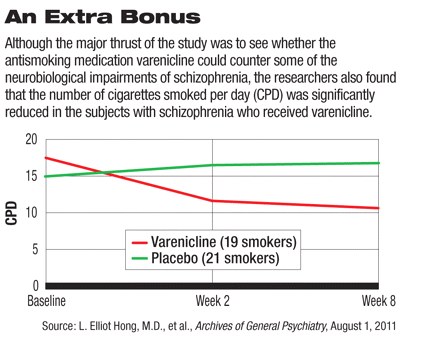Why do so many people with schizophrenia smoke?
It may be because it makes them feel better. Nicotine is known to transiently improve several neurological and cognitive impairments in patients with schizophrenia.
And now scientists have found that the antismoking medication varenicline (Chantix) can improve some of these functions as well.
The study was headed by L. Elliot Hong, M.D., an associate professor of psychiatry at the University of Maryland. Results were published online August 1 in the Archives of General Psychiatry.
Although nicotine, for a while at least, improves a number of functions in patients with schizophrenia, it's not clear which nicotinic acetylcholine receptors in the brain are responsible for these effects. However, there is one particularly strong candidate, alpha4beta2, because it plays a major role in nicotine's actions in the brain. Moreover, varenicline is known to act on this receptor.
Thus Hong and his group wondered whether varenicline might be able to improve some of the neurobiological impairments experienced by people with schizophrenia.
The cohort of their study included 69 subjects with schizophrenia or schizoaffective disorder, aged 18 to 60, and all on antipsychotic medications and stable. They were randomly assigned to either a treatment group or a placebo group. Half received, for eight weeks, a moderate dose of varenicline (1 mg a day, which is half the recommended dose for smoking cessation). The rest received a placebo during the eight-week period.
At the start of the study, during it, and at the end, all subjects were evaluated for neurobiological functions often impaired in schizophrenia, but also known to benefit from nicotine—information-processing speed, saccades, sensory gating, spatial working memory, startle reactivity, and sustained attention. Their use of tobacco was also determined.
They found that varenicline significantly reduced startle reactivity and saccade errors, regardless of subjects' smoking status. The medication also significantly reduced sensory-gating deficits in nonsmokers, but not in smokers. It had no significant effect in either smokers or nonsmokers on spatial working memory, information processing speed, or sustained attention.
The subjects getting varenicline were also evaluated to see whether it exacerbated their symptoms or made them depressed or suicidal. Such an evaluation was especially crucial since varenicline has been linked in postmarketing reports, studies, and lawsuits with suicide and violence in some people who have used it to stop smoking (Psychiatric News, March 7, 2008; August 7, 2009; February 4 and June 17). And there is a Food and Drug Administration black-box warning on the label for varenicline. Yet the researchers for the current study found no sign of varenicline producing such adverse effects.
"Our study reveals that moderate-dose treatment with varenicline has a long-term effect on specific biomarkers," Hong and his group concluded. "A longer-term treatment and/or a doseranging design could reveal further improvements because core neurophysiological impairments in schizophrenia are chronic and entrenched."
"We are cautiously excited that a number of improvements were seen in the patients," Hong told Psychiatric News. Although it is too soon to recommend varenicline as a treatment for patients with schizophrenia, he said, "these findings do encourage a more thorough evaluation, especially whether this or other nicotinic receptor drugs may help specific biological deficits associated with schizophrenia."
These findings, Hong and his group believe, should also further the development of novel compounds that act similarly to varenicline on the alpha4beta2 receptor and that "are safe and effective for treating specific neurobiological deficits."
"This is an interesting study," Ann Olincy, M.D., an associate professor of psychiatry at the University of Colorado at Denver who has done research in this area, told Psychiatric News. Since varenicline is only a partial agonist—not a full agonist—at the alpha4beta2 receptor site, it performs differently in smokers and nonsmokers, she said. And this fact may explain some of the findings regarding it, she believes—for example, why treatment with it improved sensory gating in nonsmoking subjects, but not in smokers.
The study was funded by the Stanley Medical Research Institute, the National Institutes of Health, and the University of Maryland General Clinical Research Center.


